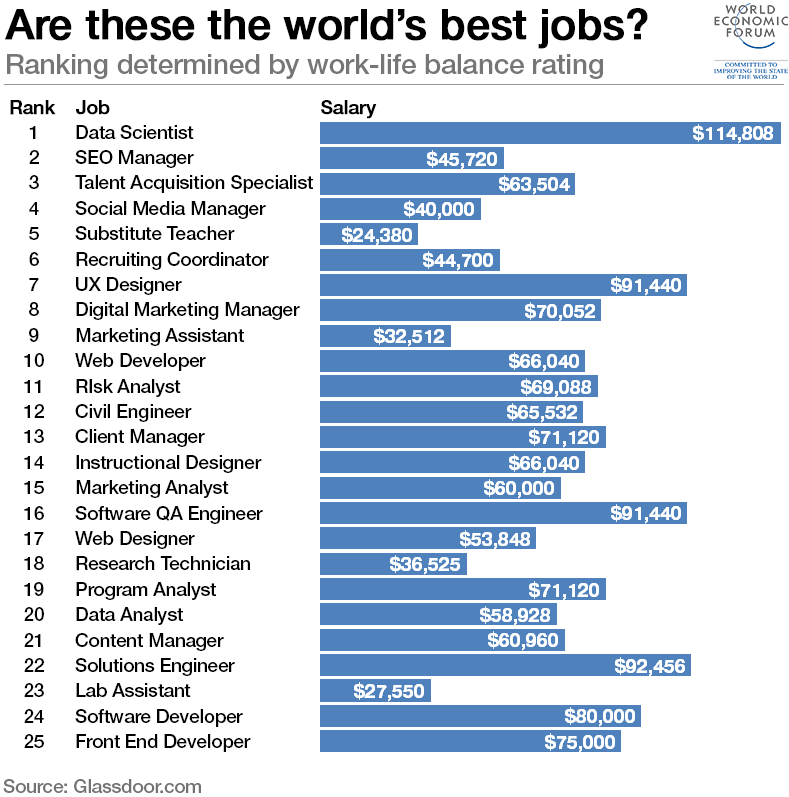How will technology change the future of work?

The millennial generation - in Asia in particular - thirsts for professional and personal development Image: REUTERS/Aly Song

Get involved with our crowdsourced digital platform to deliver impact at scale
Stay up to date:
Future of Work
When water power then steam power were harnessed to spin and weave cloth, a cottage craft turned into an industry overnight. Since then, further technological transformations have followed: Henry Ford’s production line and the transistor are two historical examples; robots, hyper-connectivity and, potentially, 3D printing are instances from our times.
But technology is just one of the factors affecting the world of work. Economics, demographics, sociological trends and government policies are four other core influences reshaping labour markets and determining how we will work for years ahead. Considering most people spend most of their time – and thus a large part of their lives – at work, such changes are central to us all. And the world of work is changing faster than ever.
The five drivers underpin the key trends for tomorrow’s workforce. Mobility is gaining importance for employer and employee alike, while hyper-connectivity is making the location of work less relevant. Challenges related to the ageing population make inclusion another salient development, with ever more emphasis on diversity at work.
A new "work-life blend"
Tomorrow’s workers will also be much more independent in terms of their attitude - not just because of all those communications gadgets in their pockets. The result will be a new “work-life blend”, in which a “job” is no longer confined to traditional working hours or places, with employees taking total control over their schedules and environments. And with greater volatility and flexibility the norm, tomorrow’s workers will have a very different approach from their predecessors, most evident through a greater emphasis on “purpose” in job selection.

What do these changes mean for countries and businesses trying to attract the best talents to boost competitiveness?
The Global Talent Competitiveness Index 2015-16, an annual study by INSEAD, Adecco and Singapore’s Human Capital Leadership Institute, focuses this year on the key role of openness for talent attraction. Mobility, it stresses, no longer means just the movement of people, but a wealth of new opportunities - often enabled by the latest technology - alongside new management practices.
In this scenario, “brain circulation” is more fitting than “brain gain” or “brain drain” to describe the potential benefits for countries of destination, transit and origin alike.
The meaning of mobility
Mobility also means seizing opportunities to boost knowledge and expertise in ways unimaginable even recently - just think of all those courses and lectures now online. For employers, mobility no longer means merely traditional expatriate placements, but moving jobs to where talented people are located.
And for countries aiming to excel in attracting talent, companies are needed that are committed to professional management practices. That means, among other things, a commitment to meritocracy, rather than promotion through cronyism or kinship. And it involves appreciating the importance of fast and relevant career development opportunities: research shows the millennial generation - in Asia’s emerging markets in particular - thirsts for professional and personal development.
For millennials especially, mobility has become a key factor in selecting a potential career path and in choosing an appropriate employer. As mobility evidently helps to develop talent, it deserves specific attention and investment from countries and businesses. Companies – or states - fail to notice these signals at their peril.
This redefinition of mobility is essential to understanding the prominence of those countries emerging as the world’s “talent champions”. The 2015-16 GTCI shows at the top of the ranking high-income nations with a long standing tradition of immigration, and economies that have a clear focus on becoming ‘talent hubs’, attracting external know-how to a greater or lesser extent.
Creating the future of work
For regulators and governments, structural reforms to remove barriers and bureaucracy and the simplification of labour markets remain paramount, along with reducing taxes on labour, boosting education and training where necessary, and supporting startups.
Employers, for their part, must boost diversity and training, fostering inter-cultural environments and an atmosphere of exchange, so all can benefit. They should invest in technology in general, and in hyper-connectivity in particular, boosting mobility and flexibility. Companies should also take steps to facilitate employee autonomy and networking. And beyond pure physical mobility, they should work to nurture a broader “mobility mindset” - a set of goals essential in today’s increasingly fluid and challenging competitive landscape.
For mobilising talent, in the broadest sense, is as much part of the fourth industrial revolution - the theme of this year’s Annual Meeting of the World Economic Forum in Davos - as water and steam were in the first.
Author: Alain Dehaze, Chief Executive Officer, Adecco Group. He is participating in the World Economic Forum’s Annual Meeting in Davos.
Don't miss any update on this topic
Create a free account and access your personalized content collection with our latest publications and analyses.
License and Republishing
World Economic Forum articles may be republished in accordance with the Creative Commons Attribution-NonCommercial-NoDerivatives 4.0 International Public License, and in accordance with our Terms of Use.
The views expressed in this article are those of the author alone and not the World Economic Forum.
Related topics:
The Agenda Weekly
A weekly update of the most important issues driving the global agenda
You can unsubscribe at any time using the link in our emails. For more details, review our privacy policy.
More on Jobs and the Future of WorkSee all
Roman Vakulchuk
April 24, 2024
Eli Joseph
April 19, 2024
Kate Whiting
April 17, 2024
Juliana Guaqueta Ospina
April 11, 2024
Victoria Masterson
April 9, 2024







